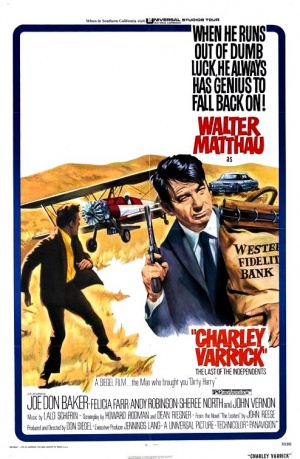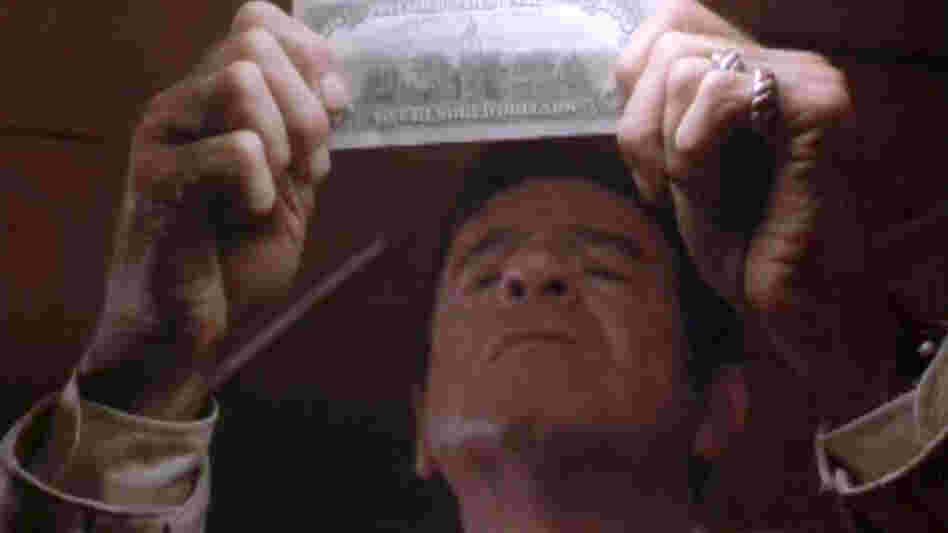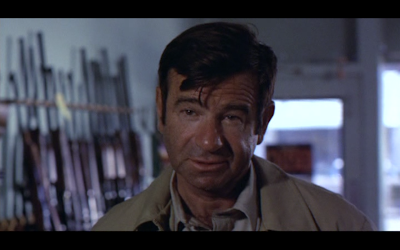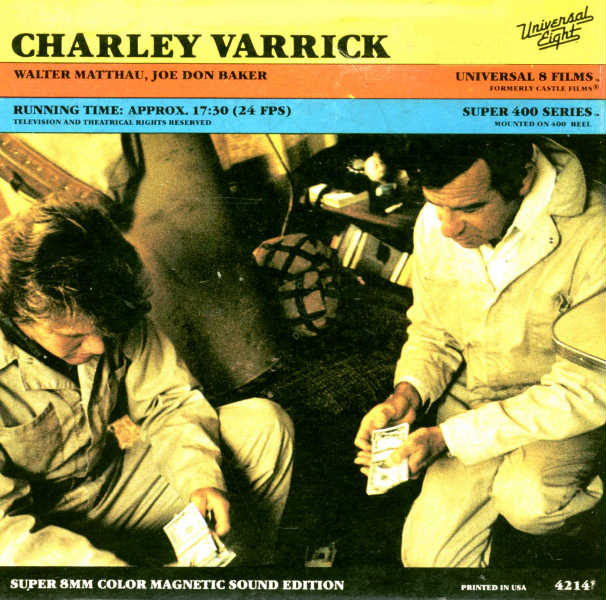Which is a shame, as there were some fantastic dark and gritty crime films being made and released back then, including The Long Goodbye (1972), The Mechanic (1972), The Friends of Eddie Coyle (1973), The Outfit (1973), The Taking of Pelham One Two Three (1974), The Yakuza (1974), and a truckload more. One of my personal favorites from this field of underappreciated gems is the 1973 crime/heist film from director Don Siegel, Charley Varrick, starring Walter Matthau, Joe Don Baker, and John Vernon.
Charley Varrick is bookended by two great action scenes, the tricky and thrilling opening bank heist pulled by Varrick (Walter Matthau) and his crew, including his wife Nadine (Jacqueline Scott) and his partner Harman (Andy Robinson), and the final chase and showdown that takes place in a junkyard and involves a bi-plane and Joe Don Baker. Both of these scenes are tense and full of creative energy. Everything in between is more subdued and calculated, but just as riveting, as Varrick and crew unexpectedly come away with almost a million dollars in mafia money, money that the mafia wants back. Varrick must use his cunning and cleverness to stay multiple steps ahead of the mob, the authorities, a ruthless hitman named Molly (Joe Don Baker), and even his partner and buddy Harman.
That's really all you need to know about the plot, or at least all I'm going to say. The details that come while watching the film are part of the thrill of experiencing the twists and turns of the narrative. Varrick is a gum chewing, level headed, rational thinker, someone who is pragmatic and practical. When he finds out what they've stolen is most likely mob money, he just nods his head coolly and moves on to solving this new problem. When Harman is talking up a storm about not waiting to spend his share of the loot, Varrick just says, "okay, you know what's best," and doesn't make a big scene about it and goes about his business, which includes hiding the money so Harman can't lay his hands on any of it.
Charley Varrick breaks a couple of the conventions of film noir by forgoing the shadows and darkness of metropolitan cityscapes and replacing it with the bright, sunlight open spaces and small-townness of New Mexico, but its landscapes are still populated by crooked, greedy lowlifes and other various miscreants and oddballs. Everybody in the movie seems greasy or weaselly or both. The callous directness of some of the characters and the intricate cause-and-effect plot mechanics recall the world depicted in Richard Stark's series of Parker novels, but with slightly softer edges. Some of the tricks and turns of the plot are telegraphed early, but when the payoff comes it is still pretty damn great.
Walter Matthau is amazing as the title character, his hangdog looks and demeanor at odds with his steely determination and decision making. He makes as unconventional an action hero as you could imagine, but he brings this cool headed intelligence to the role, making him compelling to watch, simply because you want to know what he's up to. Varrick owns an independent crop dusting business and talks about how bigger companies are pushing the smaller guys under, and how that's led him to crime (or possibly back into crime; the film never makes it clear if his earlier days involved crime, although it seems likely). His business slogan is "the last of the independents," which also works as Varrick's personal motto (it was also going to be the original title of the film) and which sort of hints at the "free spirit" that a certain population of American was searching for at that time in history.
It's said that Clint Eastwood was originally up for the role of Varrick, having worked with director Don Siegel on his previous three pictures, including the very popular Dirty Harry (1971), but I can't imagine Eastwood bringing the right presence or attitude to Varrick, not in the way Matthau does. The audience would expect Eastwood to be able to win this one right from the get-go, but Matthau is an unproven commodity as far as action movie expectations are concerned. At this time, Walter Matthau was mainly known for his comedies with Jack Lemmon, like The Fortune Cookie (1964) and The Odd Couple (1968), but he also had some excellent dramatical work in Nicholas Ray's Bigger Than Life (1956), Elia Kazan's A Face in the Crowd (1957), and Sidney Lumet's Fail-Safe (1964). His post-Varrick career includes another excellent 70s crime movie, The Taking of Pelham One Two Three (1974), and his loveably foul turn as the manager in The Bad News Bears (1976). (If you're only familiar with Walter Matthau through Grumpy Old Men (1993) then you need to knock it off and get with the program).
A great hero like Charley Varrick needs a villain that is equally measured, and to balance Matthau's cool-headed evenness, we get Joe Don Baker (in what is easily his finest role) as the ruthless and coldblooded, but surpsingly upbeat, hired hitman Molly. Unlike Varrick, who rarely has to muscle anybody, Molly muscles everybody he comes across. The guy whose car he repossesses, the girls and clients at the whore house he stays at, the wheelchair bound gun-store owner, and even the lady photographer who specializes in fake documentation, Molly punches, slaps, insults, and threatens them all with seemingly sociopathic enjoyment, wearing a big cowboy hat and an even bigger smile. He's mean as a rattlesnake, but he's also a pipe smoker who whistles to himself, is nice to dogs, and won't sleep with whores (if he knows about it). Molly seems to be a direct influence on the character of Anton Chigurah (Javier Bardem), the single-minded and ruthless killer from the Coen Brother's No Country for Old Men (2007), another film that takes place in the sun-drenched southwest. Joe Don Baker would also star in Walking Tall and The Outfit (both also 1973), as well as Mitchell (1975, immortalized on the 5th season of Mystery Science Theater 3000), The Pack (1977), Joysticks (1983), Fletch (1985), and Cape Fear (1991). He can also be seen in the upcoming and anticipated (by me at least) Mike Nichols movie, Mud (2013).
John Vernon plays Maynard Boyle, the mob money man who hires Molly to track down who robbed the bank, mainly in a preemptive effort to ensure his bosses don't think he had anything to do with the robbery. He has some good scenes with FBI agent Garfinkle (Norman Fell, wearing sunglasses just like Mr. Roper might wear) and with the bank manager Harold Young (Woodrow Parfrey) that display Boyle's own cunning and slickness. He has a line about guys using "a pair of pliers and a blow torch" that Quentin Tarantino would wholesale lift for Pulp Fiction (1994). Vernon plays a great bad guy, usually an egotist and always a dick. Vernon was the mayor in Siegel's Dirty Harry and was also in Point Blank (1967) and The Outlaw Josey Wales (1976), but he is without a doubt best known as the evil Dean Wormer from the classic college comedy Animal House (1978).I usually like to mention a couple minor supporting players and point out other minor supporting work they've done. Here's two: Woodrow Parfrey (wormy bank manger Harold Young) would play an orangutan in Planet of the Apes (1968), a Dr. Maximus to be exact (he sat in on Taylor's trial), and Sheree North (Jewell, the lady photographer) gets beat to death in Maniac Cop (1988) and was in a couple episodes of Seinfeld as Kramer's mother Babs.
Also of note, in one scene late in the movie, Matthau sleeps with a woman played by actress Felicia Farr and in general the scene feels kind of shoehorned in, which apparently it kind of was, as the scene is private joke of sorts. You see, Felicia Farr was Jack Lemmon's real life wife, and "sleeping" with her onscreen was Matthau's way of getting a dig at his old friend. I'd say the scene is out of place with the rest of the movie (and why this woman would suddenly sleep with Varrick is beyond me), even if the "joke" is kind of funny.
I saw this last week as part of the Polyester Pulp: 70s Crime Series being screened at the fantastic Hollywood Theatre this month here in Portland, OR. The 35mm print looked great and the crowd dug it.
Charley Varrick is a film I HIGHLY RECOMMEND. You can find no-frills-but-in-proper-aspect-ratio copies of it to buy online and it's on Netflix (I think) and you should also be able to find it to rent at your local video store if it's cool enough (or not even; first time I saw it, I rented it from a shitty Family Video), but if all that fails or if you're cheap, you can apparently watch the whole damn movie over on YouTube, but don't look here for a link, I'm not posting one. Sometimes if you want things, you have to work at being independent.




















No comments:
Post a Comment